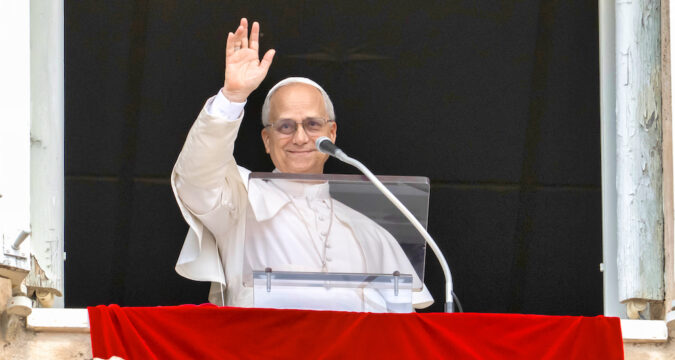
‘Peace be with you all’
On May 8, Robert Cardinal Prevost made history as the first American elected pope. He chose “Leo” as his papal name in honour of Pope Leo XIII who was head of the Catholic Church from 1878 to 1903.
In his initial remarks to the world, Leo XIV spoke of building bridges, communicating and being “open to all, to all who need our charity, our presence, dialogue, and love.” This statement echoes Leo XIII with a sense of hope for the future.
“Leo”, meaning lion in Latin, evokes an image of courage, dignity, and leadership. The lion serves as the biblical symbol of kingship as he prowls the pages of Scripture from Genesis to Revelation.
In Genesis 49:9, Judah is described as a lion’s cub: “You return from the prey, my son. Like a lion he crouches and lies down, like a lioness—who dares to rouse him?”
The lion has taken down his prey and now crouches over it, defying anyone to take it from him. This is a prophecy that Judah will be mighty, victorious, and dangerous to his enemies.
To even dare to challenge his dominance would be an act of foolish bravado. More crucially, it implies that Judah’s lineage is regal, leading eventually to Christ himself.
The lion metaphor signals legitimacy and messianic promise.
This powerful symbol also resonates in other traditions. In Chinese culture, the lion is traditionally represented as a guardian, referred to as a stone lion [石獅]. These guardian lions usually come in pairs, such as those at the entrance of the HSBC building in Hong Kong.
They are believed to provide protection, ward off evil spirits, and bring prosperity. Lions were brought into China during the Han Dynasty through trade and cultural exchange with Central Asia, along the Silk Road, and also through the spread of Buddhism. Hence, they serve as a bridge between elite and popular cultures, adapted to Chinese customs and traditions.
Evident in architecture, art, and performance, such as the lion dance, this creature is also a symbol of spiritual guardianship rooted in religious and folk traditions.
The confluence of spiritual and cultural meaning sets an interesting backdrop for diplomatic gestures under the new papacy. It is pleasing to observe that Beijing extended congratulations to Pope Leo upon his election, expressing hope to continue “constructive dialogue” with the Vatican.
Foreign ministry spokesperson, Lin Jian, said, “It is hoped that under the new pope’s leadership, the Vatican will continue to engage in constructive dialogue with China and conduct in-depth communication on international issues of mutual concern.”
Lin also expressed China’s hope that both parties could “jointly promote continued improvement of relations and contribute to world peace, stability and development prosperity.”
Pope Francis had said that the people of China are “a great people” who “must not waste their heritage.”
On May 24, speaking from the window of the Vatican’s Apostolic Palace, Pope Leo recalled the World Day of Prayer for the Church in China: “In the churches and shrines of China and throughout the world, prayers were raised to God as a sign of concern and affection for Chinese Catholics and their communion with the universal Church.”
The pope hoped the prayers will “obtain for them and for us the grace to be strong and joyful witnesses of the gospel, even in the midst of trials, to always promote peace and harmony. ”
On June 5, Leo made his first appointment of a Chinese bishop—Bishop Joseph Lin Yuntuan as the auxiliary bishop of Fuzhou—acting swiftly after Beijing’s congratulatory message.
Officially recognised by the Chinese authorities, it signals a continuation of the Sino-Vatican Agreement 2018 that sought to improve relations between the Vatican and China.
The Vatican has reported that Bishop Lin’s ministry has been “recognised” by the Chinese government, and “this event constitutes a further fruit of the dialogue between the Holy See and the Chinese Authorities and is an important step in the journey of communion of the diocese.”
Foreign Ministry spokesperson, Lin, said that the episcopal appointment agreed to by both parties showed that the 2018 Vatican-China agreement has been “smoothly implemented.”
In other words, China is willing to work with the Vatican to continue improving relations. The new pontiff’s move shows his support for reconciliation rather than confrontation.
On August 22, Pope Leo invited us to be united in prayer and fasting for peace and calls for a “disarmed and disarming peace” in all places torn by armed conflict.
The Church now finds itself under the stewardship of Pope Leo—lion by title and pastor by calling. May the attributes of the lion in Scripture blaze forth in him, not merely as a sign of divine appointment, but as a living symbol of steadfastness, courageous leadership, and spiritual guardianship.
As Daniel stood unharmed among the lions, so too may Pope Leo stand resolute amid today’s conflicts, roaring not with violence but with truth and compassion in guiding the Church through complex global relationships, including the delicate dialogue with China.
Ambrose Mong










